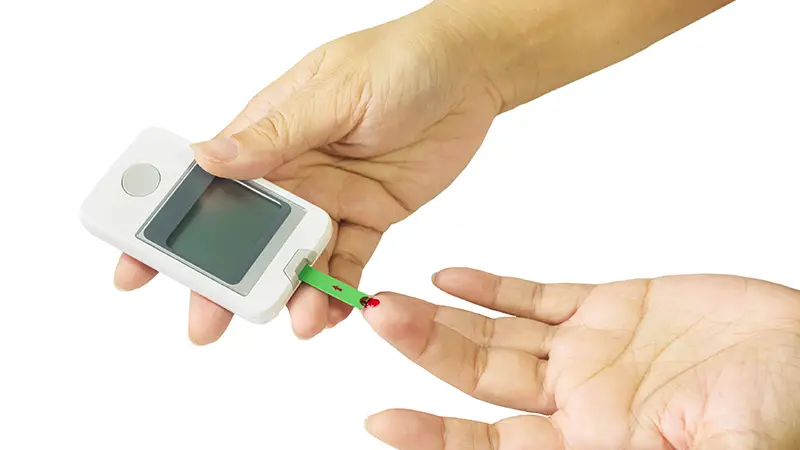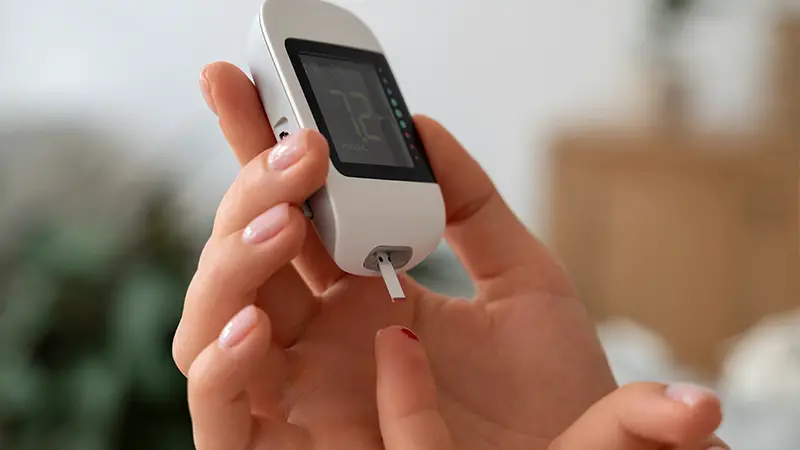Managing blood glucose levels is crucial for individuals with diabetes, as it directly impacts their overall health and well-being.
However, there are instances when your blood glucose monitoring device displays higher-than-desired readings, causing concern and confusion. If you’re wondering ‘Why my blood glucose machine reading high‘, this article is for you.
In this informative guide, we will delve into the potential reasons behind elevated blood glucose levels and explore strategies to address them. High blood glucose, also known as hyperglycemia, occurs when there is an excess of sugar in your bloodstream.
It can be a result of various factors, including diet, physical activity, medication, and stress. Monitoring and understanding these fluctuations is vital for effective diabetes management.
In the following sections, we will investigate common factors that may cause your blood glucose readings to spike.
Why is My Blood Glucose Machine Reading High?

If you’ve recently checked your blood glucose levels and found that they’re higher than usual, several factors could be contributing to this unexpected reading.
Understanding why your blood glucose machine is reading high is essential for managing your diabetes effectively and making necessary adjustments to your lifestyle and treatment plan.
Let’s explore the common reasons behind elevated blood sugar levels and offer insights into how to address and prevent them.
Dietary Factors and Overeating
Diet plays a significant role in blood glucose management. Certain food choices and eating patterns can lead to elevated blood glucose levels:
Consuming too many carbohydrates, especially those with a high glycemic index, can cause rapid spikes in blood glucose. Pay attention to portion sizes and choose complex carbohydrates over simple sugars.
Eating more calories than your body requires can lead to higher blood glucose levels. Portion control and mindful eating are crucial.
Irregular Meals
Skipping meals or eating irregularly can disrupt blood glucose control. Try to maintain a consistent meal schedule.
Snacking on sugary or high-fat foods can lead to blood glucose spikes. Opt for healthier snack options, such as fruits, vegetables, or nuts.
Alcohol Consumption
Alcohol can lower blood glucose initially but lead to subsequent spikes. Consume alcohol in moderation and be aware of its effects on your blood glucose.
Changes in your medication or insulin regimen can impact blood glucose levels. Factors to consider include:
Missed Doses
Skipping or missing medication doses can cause blood glucose to rise. Adherence to your prescribed medication plan is crucial.
Sometimes, the prescribed dosage of medication or insulin may not be sufficient to control your blood glucose. Consult your healthcare provider to adjust your treatment plan if necessary.
Medication Timing
Taking medication at the wrong time in relation to meals can lead to erratic blood glucose levels. Follow your healthcare provider’s guidance on when to take your medications.
Physical Activity
Exercise can influence blood glucose in both positive and negative ways. A sedentary lifestyle can contribute to elevated blood glucose. Regular physical activity helps improve insulin sensitivity and blood glucose control.
Overexertion
Intense or prolonged exercise can cause blood glucose to drop initially and then rebound to high levels. Monitor your blood glucose closely during and after exercise, and adjust your carbohydrate intake accordingly.
Stress, anxiety, and strong emotions can trigger the release of stress hormones, which can elevate blood glucose.
Coping Strategies
Develop healthy coping mechanisms to manage stress, such as relaxation techniques, mindfulness, or talking to a therapist.
Ensure you get enough sleep, maintain a balanced lifestyle, and practice stress-reduction techniques to keep your stress levels in check.
Illness and Infection
When you’re sick, your body releases stress hormones and glucose, potentially leading to high blood glucose levels:
During illness, monitor your blood glucose frequently and follow your healthcare provider’s guidance on adjusting your medication.
Illness can lead to dehydration, which can further elevate blood glucose. Drink plenty of fluids to stay hydrated.
Hormonal Changes
Hormonal fluctuations, such as those associated with the menstrual cycle, menopause, or certain medical conditions, can affect blood glucose levels.
Understanding these changes and working with your healthcare provider to adjust your treatment plan as needed is essential.
Infections and Inflammation
Infections and other inflammatory conditions can raise blood glucose levels. It’s crucial to manage these health issues promptly and monitor your blood glucose more frequently.
Some medications, including corticosteroids and certain anti-inflammatory drugs, can cause elevated blood glucose levels. If you are prescribed such medications, work closely with your healthcare provider to manage your blood glucose.
Aging
As we age, our body’s insulin sensitivity may decrease, which can lead to higher blood glucose levels. Regular check-ups with your healthcare provider can help you adapt your diabetes management plan to these changes.
Sometimes, high blood glucose readings can be a result of equipment issues, such as expired test strips or a malfunctioning blood glucose meter. Ensure your equipment is in good working order and that you are using it correctly.
Can We Trust Glucometers?

Glucometers, or blood glucose meters, are essential tools for individuals with diabetes. They provide a convenient means of monitoring blood sugar levels, allowing for timely adjustments in treatment plans and lifestyle choices.
However, the question of whether we can trust glucometers is a pertinent one. The reliability of these devices is critical in managing diabetes effectively.
Accuracy and Precision
Glucometers have come a long way in terms of accuracy and precision. The technology and algorithms used in modern devices are continually improving, making them increasingly reliable.
Nevertheless, it is important to recognize that no device is entirely free from potential sources of error. Factors such as strip quality, calibration, user technique, and the condition of the device itself can impact accuracy.
Use High-Quality Strips
The accuracy of a glucometer is heavily dependent on the quality of the test strips used. Low-quality or expired test strips can produce inaccurate readings.
Always use high-quality, unexpired test strips from reputable manufacturers. Ensure they are stored according to the manufacturer’s recommendations.
Regularly conduct control tests using the control solution provided by the manufacturer to verify the accuracy of the test strips and the glucometer.
User Technique
User technique is a significant factor in the reliability of glucometer readings. Common user errors include insufficient blood samples, improper finger handling, or misapplication of blood to the strip.
Carefully follow the manufacturer’s instructions for using the glucometer, including finger preparation and blood application.
Ensure you provide an adequate blood sample as specified by the manufacturer. Avoid squeezing or milking the finger excessively.
Calibration
Calibration is essential to the accuracy of a glucometer. Some devices require manual calibration when changing to a new batch of test strips or when specific circumstances warrant it. Failing to calibrate the device correctly can lead to inaccuracies.
Follow the manufacturer’s guidelines on when and how to calibrate your glucometer. This is typically required when opening a new box of test strips.
Environmental Factors
Environmental conditions can influence the accuracy of glucometer readings. Factors such as extreme temperatures or high humidity can affect the device’s performance. To ensure reliable readings:
Store your glucometer and test strips in a controlled environment within the manufacturer’s recommended temperature and humidity range.
Sensor Errors (Continuous Glucose Monitors)
Continuous glucose monitors (CGMs) are becoming increasingly popular in diabetes management. These devices continuously measure glucose levels using a sensor inserted under the skin.
While CGMs provide valuable real-time data, they are not free from potential inaccuracies due to sensor malfunction, calibration issues, or external factors affecting the sensor. To trust CGM readings:
Calibrate Properly
Follow the manufacturer’s calibration instructions and ensure you have accurate reference glucose readings. Be diligent in maintaining and caring for the sensor site to minimize inaccuracies.
Consult with Healthcare Professionals
A crucial aspect of trusting glucometer readings is consulting with your healthcare team. Your healthcare provider, diabetes educator, or nurse can offer guidance on the use of your specific glucometer, interpret readings, and help you make informed decisions based on the results.
Regular communication with your healthcare team is essential for effective diabetes management.
How to Control Blood Glucose?

Controlling blood glucose levels is crucial for overall health, particularly for individuals with diabetes. Here are the key ways to manage blood glucose:
Dietary Management
A well-balanced diet is a cornerstone of blood glucose control. Focus on complex carbohydrates like whole grains, vegetables, and legumes, as they have a gentler impact on blood sugar.
Limit your intake of simple sugars and refined carbs found in sugary snacks and processed foods. Portion control is vital; use tools like measuring cups to ensure you’re not overeating. Consider working with a registered dietitian to create a personalized meal plan tailored to your needs.
Regular Physical Activity
Exercise is an effective way to manage blood glucose. Physical activity helps your body use insulin more efficiently and can lower blood sugar levels. Aim for at least 150 minutes of moderate-intensity aerobic exercise per week, such as brisk walking or cycling.
Strength training is also beneficial for increasing muscle mass, which can aid in glucose regulation. Consult your healthcare provider before starting a new exercise regimen, especially if you have any health concerns.
Medication and Insulin Management
For individuals with diabetes, medications or insulin may be necessary to control blood sugar. Adhering to the prescribed dosage and schedule is essential. Be aware of potential side effects and interactions with other medications.
Regularly monitor your blood glucose to gauge the effectiveness of your treatment plan. Communicate with your healthcare provider to adjust medications or insulin as needed.
Lifestyle Factors
Stress management is vital because stress hormones can raise blood sugar. Practice relaxation techniques like meditation, deep breathing, or yoga to mitigate stress’s impact. Ensure you get adequate sleep, as poor sleep can affect insulin sensitivity.
Additionally, limit alcohol consumption and be mindful of its effects on blood sugar. If you smoke, consider quitting, as it can worsen diabetes complications.
Regular Monitoring and Healthcare
Regular checkups with your healthcare provider are crucial for blood glucose control. They can conduct tests, provide guidance, and adjust your treatment plan based on your progress and changing needs.
Self-monitoring with a glucose meter allows you to track your blood sugar at home, enabling you to make immediate adjustments to your diet, activity, or medications. Stay informed about the latest advancements in diabetes management and be proactive in managing your condition.
FAQs
How often should I calibrate my glucometer?
The frequency of calibration depends on the specific glucometer you are using. In general, you should calibrate when opening a new box of test strips and as directed by the manufacturer.
What should I do if my glucometer shows a result that seems inaccurate?
If you suspect an inaccurate reading, consider retesting using the proper technique. Ensure your hands are clean and dry, provide an adequate blood sample, and follow all instructions precisely.
Can environmental conditions affect glucometer accuracy?
Yes, environmental factors can influence the accuracy of glucometer readings. Extreme temperatures, high humidity, and altitude can impact the device’s performance.
How often should I perform control tests with my glucometer?
Control tests should be conducted according to the manufacturer’s recommendations. Typically, control tests are performed when opening a new box of test strips and as part of regular maintenance.
Are continuous glucose monitors (CGMs) as reliable as traditional glucometers?
CGMs provide real-time data and trend information, which can be highly valuable for diabetes management. They are generally reliable, but like traditional glucometers, they are not entirely free from potential inaccuracies.
Conclusion
Maintaining optimal blood glucose levels is a fundamental aspect of managing diabetes and promoting overall well-being.
High blood glucose readings can be a cause for concern, but with the right knowledge and strategies, you can address and prevent these spikes effectively.
It’s important to remember that everyone’s body is unique, and what works for one person may not work for another.
Regular monitoring, open communication with healthcare professionals, and a proactive approach to diabetes management are essential.
By paying attention to your diet, staying physically active, adhering to medication plans, and managing stress, you can make significant strides in controlling your blood glucose levels.
Additionally, don’t underestimate the power of support from loved ones and diabetes support groups. Sharing your experiences and learning from others can provide valuable insights and motivation on your journey to better blood glucose control.
Hi, I’m Mark Pattinson and I’m a freelance personal trainer. I’ve been working in the fitness industry for over 10 years especially since I work with diabetes patients and I love helping people achieve their fitness goals. I believe that everyone can benefit from a good workout, and I’ll do everything to make sure you get the most out of your training.